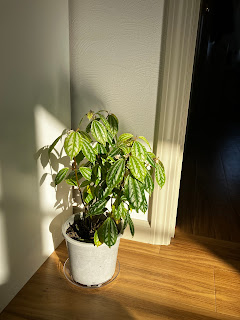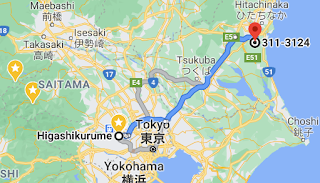
These last five months has been a rebuilding time for my little potted garden. I got back some of the plants that I gave to others to take care of for the year we were away. Not all the plants made it through the transition to different locations and caretakers, so there was a fair bit of natural attrition. But as I got back some "old friends", I also got some new plants from the ladies who were looking after my plants, which was a surprise. On top of that I bought some new plants too. So now I have 21 pots with plants in them. Some are enjoying the bay window in our living room, two are in the dining/multipurpose area, and the rest are out on our tiny balcony, sharing space with laundry some days.
I felt very happy when my new garden was largely assembled. Why? Apparently there are many benefits to having indoor plants in your life (see this Time article, which, amongst other things cites an experiment where people who spent five to ten minutes in a room with a few houseplants felt happier than those in a plant-free room!) They are generally good for your mental health, though obviously not if plants are dying on you, which is why I always advise people to start with easy plants like geraniums, which are super hard to kill in moderate climates (mine survived being snowed on in Tokyo but didn't survive a year in a higher altitude when temperatures are much lower than here)!
I particularly enjoy plants that I can nurture and see grow, rather than those you can buy fully grown and just water. There is also a lot of satisfaction in making changes so that a plant starts to thrive again. The Parlor Palm we have started out as a tiny little thing I bought for 100 yen (about a dollar)! It's now quite tall.
 |
| My sick maidenhair. I moved it outside because I was concerned the fungus might jump ship to other plants, so I guess it's in isolation! |
The maidenhair fern also started quite small and the second one (pictured) is a baby of the larger one. They've both been through some rough times. I think I'll have to wait till the weather warms us to see how they go. The latest drama with the little one seems to be a fungus of some sort.
 |
| Miniature rose |
My miniature rose was a gift from David five years ago and it also has survived a few different crises. When we got it back this year it was just sticks and very dry, thankfully regular watering has revived some of the "sticks" and I'm hoping for good things come spring.
On either side of the rose you can see my efforts at a little bit of vegetable growing, but haven't had much success yet: my lettuces are still sprouts and I'm really not sure about the plants I thought were spring onions.
 |
| Baby hydrangeas. I don't know why they still have leaves...but I hope they flower in June! |
 |
| One of the surprises: another kind of geranium, but I don't think it is well, it's also in iso. |
 |
| The beautiful geranium flowered just in time for Christmas. |
 |
| On the edge here is my lavendar: first time trying to grow this plant. It's also not looking great, but I'm hopeful. |
 |
| My Aluminum Plant. I've shifted it around a few times trying to find the right light and temperature combos, it seems to be thriving in this spot where it gets light for a short period most mornings. |
I'm so glad to be settled in a place where I can have a garden again. I enjoy watering it and tinkering with it. It's a very small hobby that takes little time and not much money, but brings joy and colour into our lives.






